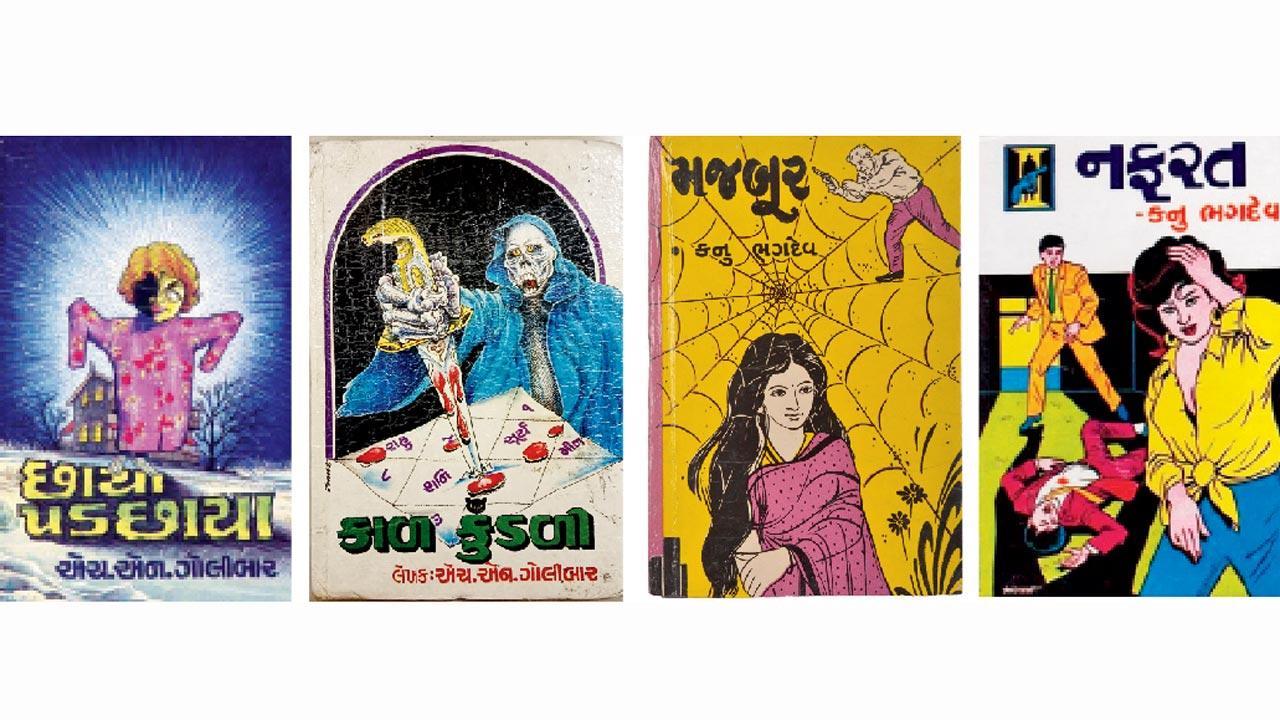An upcoming anthology captures the inventiveness of beloved Gujarati page-turners across the genres of horror, crime, and adventure

Covers for Chaya Prachaya and Kaal Kundali authored by HN “Atom” Golibar, created by N Manwar; alongside covers for Majboor and Nafrat by Kanu Bhagdev. Cover art for Gujarati pulp fiction published in the 20th century was detailed and inviting, evoking a sense of mystery in the reader even before they flipped through its pages
There are many ways to tell when an author is successful: They find mention in bestseller lists and they’re invited to countless literature festivals. They have legions of fans on social media; some old-fashioned ones may even write letters and emails to them. They win awards, and the term “critically acclaimed” foreshadows them.
But perhaps no marker of success compares to this particular one earned by HN ‘Atom’ Golibar, a prolific author of horror and crime thrillers in Gujarati: (Urban) legend has it that his collections at a Junagadh library were in tatters. Readers would tear away his iconic book covers to use as decor, or take out pages from the middle, ensuring the plot’s mystery only deepened.
Golibar’s writing and covers will soon be available for English readers to obsess over, as part of an upcoming anthology of Gujarati pulp fiction. Translated and curated by Vishwambhari S Parmar, and published by Blaft Publications, it is a coming-together of short stories and novellas by Bansidhar Shukla, Kanu Bhagdev and Ekta Nirav Doshi—writers who have enjoyed wide readership across genres such as sci-fi and adventure.
 Jenny Bhatt, writer, literary translator and book critic; (right) Vishwambhari S Parmar, translator
Jenny Bhatt, writer, literary translator and book critic; (right) Vishwambhari S Parmar, translator
Parmar, who was once an intern at Blaft, says that it is challenging to determine exactly how established these writers are. Aside from standalone books, their works would typically be published in a serialised format in periodicals, magazines, and newspapers. “It’s not considered ‘respectable’ to read pulp fiction or to be a pulp fiction author... We desisted from approaching a popular author because we learnt that s/he would not call themselves a writer of pulp,” says Parmar, who explains that the stigma against the genre continues to prevail, “Authors, who write in genres that are pulp-adjacent, still shy away from the label. Maybe even their readers would be offended if they were categorised like that.” Tellingly, Kanu Bhagdev—who has written over 300 books—doesn’t have a Wikipedia page to his name.
Though the genre is known to be formulaic across languages, the Gujarati authors featured in the anthology crafted inventive, out-of-the-ordinary worlds and plots. In Varunlokma, Bansidhar Shukla imagines an undersea empire populated by genetically-altered merpeople. “If you embrace pulp writing, it comes with a lot of liberties,” Parmar remarks, “Literary fiction is riddled with rules and hierarchy. Most of those who succeed, write realist fiction. The very things that pulp fiction is criticised for—being unrealistic, sensationalist—are its strengths. These are qualities that an author can use to appeal to an audience.”
Of the stories she has picked for the book, Parmar’s own favourite is the revenge fantasy novella Bar Dancer by Vibhavari Verma that also has shades of romance; its protagonist is a bar dancer who also works as domestic help. “The language Verma employs is not formal Gujarati, it’s conversational. Since it is set in Mumbai, she uses a number of languages—a bit of Marathi and Hindi, a little broken English. I don’t think literary fiction would have afforded the same freedom,” says the translator.
Bar Dancer is also among those examples of pulp fiction rooted in context, and which offers readers a look into the social mores of the era it is set in. “One of Bhagdev’s novels, like most of his works, is a crime thriller whose focal point is dowry. At its centre is a new bride harassed by the family she marries into,” Parmar explains.
Notably, many of the big names associated with the genre are men, though more female authors such as Vibhavari Verma and Ekta Nirav Doshi emerged in the 21st century. Jenny Bhatt, a writer, literary translator, and book critic, argues that the few women who are working in pulp fiction ought to be discussed for their literary achievements. “For example, Varsha Adalja’s noir fiction is particularly effective in conveying gender, class, and caste issues embedded within interesting storylines. And Ekta Nirav Doshi writes riveting stories with such immersive prose,” Bhatt says.
Blaft’s anthology, expected to be released in December 2024, is a vital step forward for the genre, which has not often been the subject of translation from Gujarati to English. “Within publishing, translation is seen as a medium to amplify sales of popular works,” says Parmar as she elucidates concerns of commerce. “Because the readership of vernacular pulp fiction is limited to one state or region, or to readers who know the language, sales of a translation will be limited.”
Bhatt rues that pulp fiction does not receive much respect or attention within the Gujarati literary community itself. “I have never understood this because the average Gujarati reader,” she says, “from what I have seen, loves to read pulp fiction… If the Gujarati literary community recognises and appreciates popular writers, English translation publishers might also become more open to publishing pulp fiction in translation.”
 Subscribe today by clicking the link and stay updated with the latest news!" Click here!
Subscribe today by clicking the link and stay updated with the latest news!" Click here!








